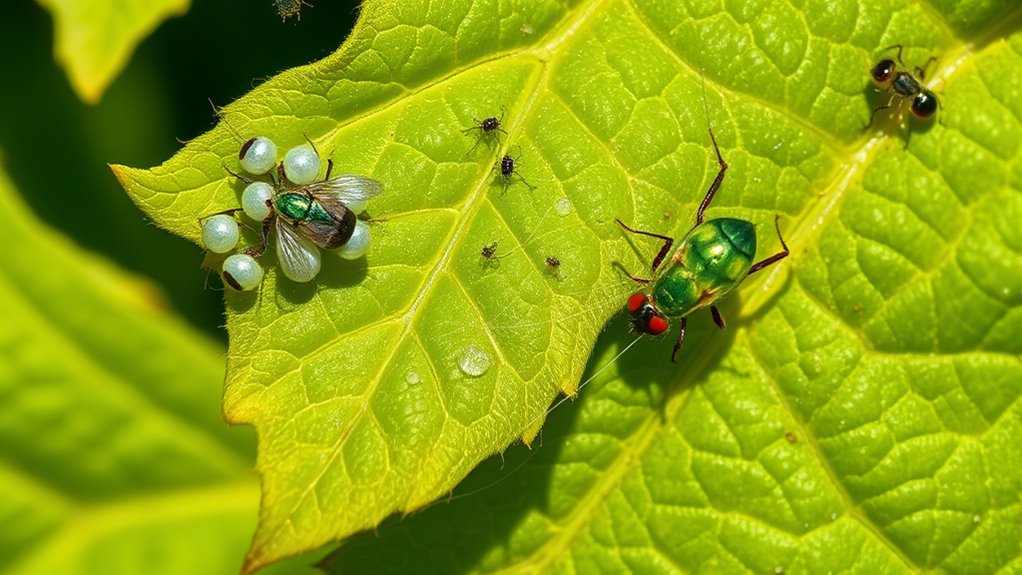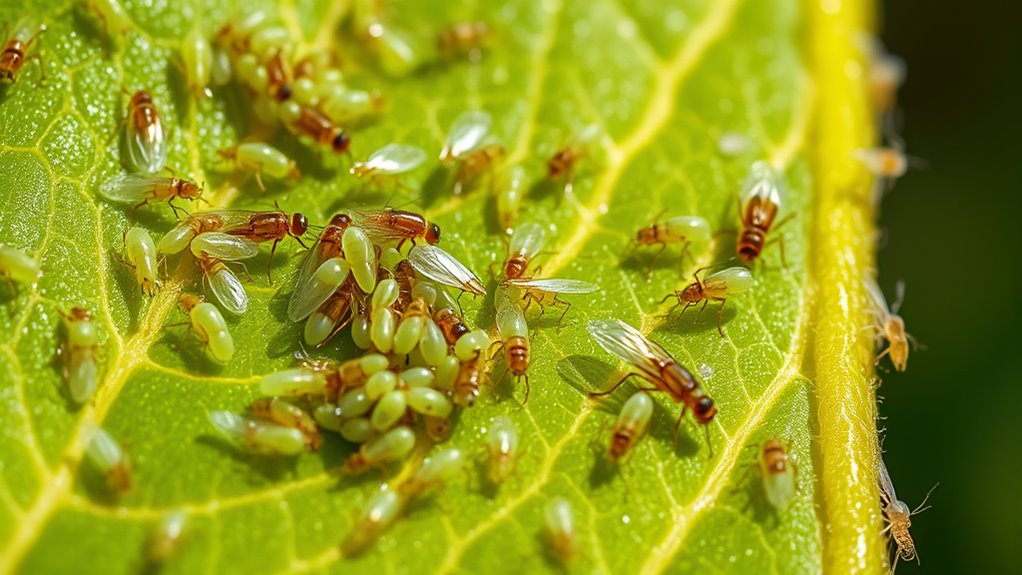To fight tiny invaders like aphids, whiteflies, and spider mites, act quickly with natural solutions. Introduce beneficial insects such as ladybugs and predatory mites to keep pest numbers down. Use organic sprays like neem oil or insecticidal soap to target remaining pests safely. Maintain healthy plants by proper watering and cleanliness, and keep a close eye on your garden. The best strategies can make a real difference—discover more effective tactics below.
Key Takeaways
- Detect pests early through signs like sticky residue, yellowing leaves, and tiny moving specks.
- Release natural predators such as ladybugs for aphids and predatory mites for spider mites.
- Use organic sprays like neem oil or insecticidal soap to target and disrupt pest life cycles effectively.
- Combine biological control with organic sprays and proper plant care for integrated pest management.
- Maintain healthy garden conditions and monitor regularly to prevent and control infestations proactively.

Tiny pests like aphids, whiteflies, and spider mites might be small, but they can cause big problems for your plants. These tiny invaders can quickly multiply, sapping nutrients and weakening your plants’ overall health. If you notice sticky residue on leaves, yellowing, or tiny moving specks, it’s time to act before the infestation gets out of control. The good news is, you can combat these pests effectively with natural predators and organic sprays, keeping your garden safe and chemical-free.
Natural predators are a powerful tool in your pest control arsenal. Introducing beneficial insects like ladybugs, lacewings, or predatory mites can considerably reduce pest populations. Ladybugs, for example, love to feast on aphids, while predatory mites are excellent at controlling spider mites. You don’t need to buy these predators repeatedly—once released, they’ll continue to hunt down pests as long as conditions remain favorable. Keep in mind that these natural enemies work best in healthy, well-maintained environments, so maintain proper watering, pruning, and fertilization to foster a balanced ecosystem.
Organic sprays are another effective option for managing tiny pests without harmful chemicals. Neem oil, insecticidal soap, and horticultural oils are popular choices because they target pests on contact and disrupt their life cycles. They’re safe to use on most plants and won’t harm beneficial insects when applied carefully, especially early in the day or late in the evening. When using organic sprays, be diligent—cover all plant surfaces, including undersides of leaves, where pests often hide. Repeat applications may be necessary to break the pests’ reproductive cycle and prevent re-infestation.
Combining natural predators with organic sprays gives you an all-encompassing approach to pest control. For example, releasing ladybugs early in the season can reduce aphid populations, while applying insecticidal soap can eliminate remaining pests and those that are harder to reach. Regular inspections help you catch problems early, making treatment easier and more effective. Remember, healthy plants are more resistant to pests, so maintain proper watering, nutrition, and sanitation in your garden.
Frequently Asked Questions
How Can I Prevent Infestations Before They Start?
To prevent infestations before they start, you should focus on maintaining healthy soil through proper composting and watering. Incorporate companion planting by growing pest-repellent plants alongside your crops, like marigolds or basil. These natural allies can deter aphids, whiteflies, and spider mites. Regularly inspect your plants for early signs of pests, and guarantee good air circulation. Staying proactive with these strategies helps keep your garden pest-free.
Are There Eco-Friendly Methods to Control These Pests?
You can control pests eco-friendly by encouraging beneficial insects like ladybugs and lacewings in your garden. These natural predators help keep aphid, whitefly, and spider mite populations in check. Additionally, use organic sprays such as neem oil or insecticidal soap, which are safe for the environment and effective against these pests. Combining these methods creates a sustainable, chemical-free approach to pest management.
Which Plants Are Most Resistant to Aphids, Whiteflies, and Spider Mites?
Think of certain plants as armor-clad warriors on your garden battlefield. You’ll find that plants with high plant resistance or pest resistant varieties naturally fend off aphids, whiteflies, and spider mites. Examples include marigolds, chives, and garlic, which are less attractive to these pests. Choosing these resilient varieties helps you reduce chemical use and keeps your garden thriving with minimal fuss, turning pests into mere nuisances.
How Often Should I Check My Plants for Pests?
You should check your plants at least once a week for pest identification and damage symptoms. Regular inspections help catch issues early, preventing serious infestations. Look closely at the undersides of leaves and new growth, where pests often hide. By staying vigilant, you can spot pests quickly, assess damage symptoms, and take swift action to protect your plants from harm. Consistency is key to healthy, pest-free plants.
Can Natural Predators Effectively Eliminate These Pests?
You might wonder if natural predators can effectively eliminate pests. Biological control can be a smart strategy, as introducing predator insects often reduces pest populations naturally. However, predator effectiveness depends on proper identification, timing, and environmental conditions. While not always a complete solution, combining biological control with other methods boosts your chances of managing pests sustainably. Regular monitoring helps guarantee predator success and keeps your plants healthy.
Conclusion
Now that you know how to spot and fight these tiny invaders, imagine your garden as a peaceful oasis, untouched by their relentless march. Picture your plants standing tall and healthy, their leaves shining under the sun, free from pests’ tiny claws and wings. With your vigilance and quick action, you become the defender of this lush paradise. Keep up the fight, and let your garden flourish, vibrant and pest-free, a true haven for your green friends.









